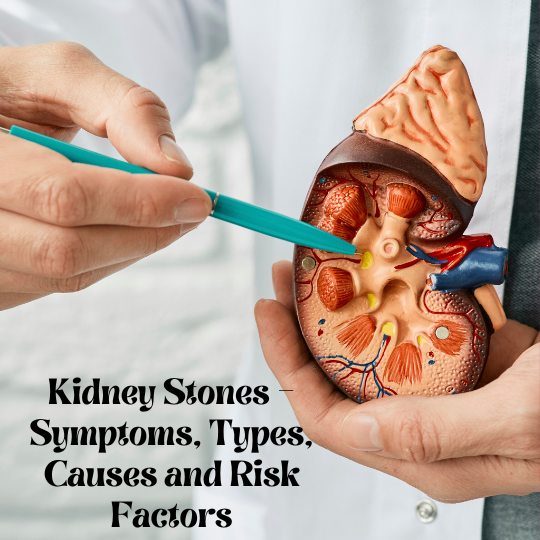Kidney stones are a common yet painful condition affecting millions of people worldwide. They are tiny, hard-mineralized deposits that form within your kidneys and cause severe discomfort as they pass through the urinary tract. Even the kidney stones pain is terrible, understanding the kidney stone problem symptoms, types, causes, and risk factors associated with it is crucial for prevention and timely kidney stones treatment.
What are Kidney Stones?
These stones are hard masses formed when dissolved minerals in your urine crystallize and clump together. Normally, your urine can hold these minerals in solution, but certain factors can disrupt this balance, leading to stone formation.
Symptoms of Kidney Stones:
The symptoms can vary depending on their size, location, and whether they are obstructing the urinary tract.
Kidney stones pain can be unbearable, often described as a sharp, cramping sensation in the lower back or abdomen that may radiate to the groin or genitals. The pain can come and go in waves, intensifying as the stone moves through your urinary tract.
Common symptoms:
- Intense pain in the back, side, abdomen, or groin
- Painful urination (Dysuria)
- Blood in the urine (Hematuria)
- Nausea and vomiting
- Frequent urination (Urgency)
- Difficulty passing urine (Oliguria)
- Fever and chills (if an infection is present)
Types of Kidney Stones:
There are several types, each with slightly different causes:
- Calcium Stones: The most common type, typically made of calcium oxalate or calcium phosphate.
- Struvite Stones: Often associated with urinary tract infections and can grow rapidly.
- Uric Acid Stones: Formed when urine is too acidic and can be caused by a diet high in purines (found in certain foods).
- Cystine Stones: Rare and caused by a genetic disorder that leads to high levels of cystine in the urine.
Kidney Stone Causes & Risk Factors:
Some of the Kidney stone causes are:
- Dehydration, leading to concentrated urine that allows minerals to crystallize and form stones.
- Dietary factors, such as consuming foods high in oxalate, sodium, or purines.
- Certain medical conditions, including obesity, digestive diseases, and urinary tract infections.
- Family history of kidney stones.
- Certain medications or supplements that increase the risk of stone formation.
Risk Factors:
- Personal or family history of kidney stones.
- Dehydration, especially in hot climates or during vigorous exercise.
- Certain diets high in salt, sugar, or animal proteins.
- Obesity or weight gain.
- Digestive diseases or surgeries that affect the absorption of nutrients.
- Medical conditions such as hyperparathyroidism or renal tubular acidosis.
Conclusion:
If you suspect you have kidney stones or experience symptoms, it’s essential to seek medical attention promptly. Treatment options may include pain management, hydration, and medications to help pass the stones, or surgical intervention in severe cases. Maintaining a healthy lifestyle, staying hydrated, and following a balanced diet can help reduce the risk of developing kidney stones.
For more details follow us on Social Media!!

